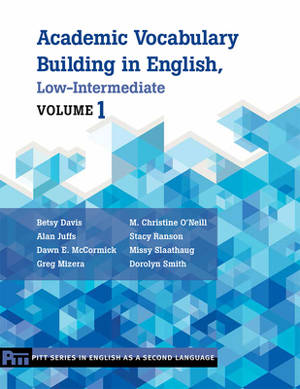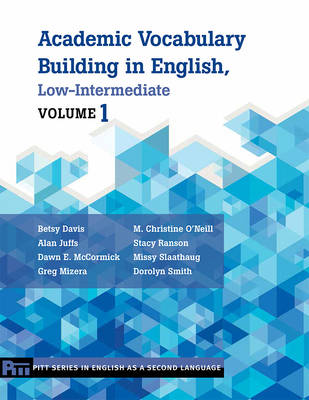
- Retrait gratuit dans votre magasin Club
- 7.000.000 titres dans notre catalogue
- Payer en toute sécurité
- Toujours un magasin près de chez vous
- Retrait gratuit dans votre magasin Club
- 7.000.0000 titres dans notre catalogue
- Payer en toute sécurité
- Toujours un magasin près de chez vous
Academic Vocabulary Building in English, Low-Intermediate
Volume 1 Volume 1
Betsy Davis, Dawn E McCormick, Greg Mizera, M Christine O'Neill, Stacy Ranson, Marilyn Smith Slaathaug, Dorolyn Smith, Alan Juffs
29,45 €
+ 58 points
Description
The English Language Institute at the University of Pittsburgh is known for its popular eight-volume series Words for Students of English (University of Michigan Press). In the years since the series was first published, faculty at Pitt ELI has been considering new ways to address learners' challenges in acquiring vocabulary. The result of the research and experience is a new five-volume series, Academic Vocabulary Building in English. This series weaves together three sets of knowledge: (1) the results of recent research from applied linguists and psycholinguists, (2) the rich classroom experience of the Institute faculty, who together have many decades of practical classroom ESL experience, and (3) the data gathered from our online student database and corpus studies that have informed us of which words students need to know more deeply. Each unit contains sections that emphasize various components of word learning. First, each chapter opens with a chart of target words and their various morphological forms. The next step establishes form-meaning mappings: Each word is listed with a definition and two example sentences. The lists and definitions are followed by exercises that concentrate students' attention on establishing form-meaning links. These exercises consist of practice opportunities that require multiple retrievals in order to promote label-to-concept links and begin awareness of derivational and inflectional variations. Follow-up exercises focus on collocations related to the unit's theme. Each chapter closes with exercises that can be used as quizzes. By the time students have finished a unit, they should have had both receptive and productive practice with the form, meaning, morphosyntax, and collocational properties of each lexical item.
Spécifications
Parties prenantes
- Auteur(s) :
- Editeur:
Contenu
- Nombre de pages :
- 184
- Langue:
- Anglais
- Collection :
Caractéristiques
- EAN:
- 9780472034215
- Date de parution :
- 30-06-15
- Format:
- Livre broché
- Format numérique:
- Trade paperback (VS)
- Dimensions :
- 203 mm x 251 mm
- Poids :
- 408 g

Les avis
Nous publions uniquement les avis qui respectent les conditions requises. Consultez nos conditions pour les avis.






